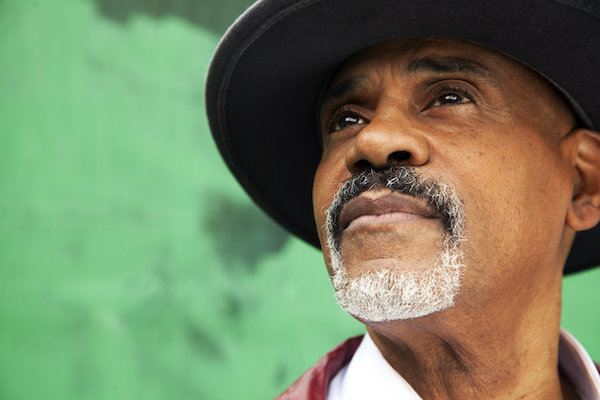Dec 9, 2025 12:28 PM
In Memoriam: Gordon Goodwin, 1954–2025
Gordon Goodwin, an award-winning saxophonist, pianist, bandleader, composer and arranger, died Dec. 8 in Los Angeles.…

Allan Harris’ Kate’s Soulfood is premised on recollections of his aunt’s diner.
(Photo: Hollis King)Growing up in Brooklyn, singer and guitarist Allan Harris regularly visited his mother’s family in Harlem on the weekends. His aunt, Kate Ingram, owned a popular luncheonette, Kate’s Home Cooking on the corner of 8th Avenue and West 126th Street. In addition to serving soul-food staples such as fried chicken, collard greens and peach cobbler, the diner functioned as a nexus for Harlem residents, Black artists, politicians and entrepreneurs.
“That food built a shield around us, emotionally and physically. It was not just people of color, who came into money through the arts or who lucked out through real estate,” Harris said. “People who were the first generation, who actually came off the plantations and made their way to Harlem, ate there, too.”
Kate’s Home Cooking became so popular that it was featured on the cover of Jimmy Smith’s 1959 Blue Note effort, Home Cookin’. Harris was just a kid when that photo shoot happened, but because he was constantly surrounded by Black artistic excellence, his life seemed ordinary: Johanna Chemina Ingram-Harris, his mother, attended New York’s High School for the Performing Arts on a piano scholarship; ballet dancer Arthur Mitchell lived down the street from his home; and opera singer Leontyne Price was a regular visitor to Harris’ house.
“It wasn’t until I got older that I really recognized the significance of that photo shoot for Jimmy Smith’s album,” Harris said. “I started looking back and reliving many of those experiences involving my aunt Kate’s diner through the eyes of people who weren’t exposed to that.”
Harris pays homage to the diner with his captivating new disc, Kate’s Soulfood (Love Production). The bandleader’s working ensemble is augmented by harmonica player Grégoire Maret, percussionist David Castañeda and tenor saxophonist Keith Fiddmont. But Harris also recruited Kamau Kenyatta as a producer.
“[Kenyatta] is more than a producer; he’s more a sage, who just happens to make music,” Harris enthused. “His ideas about life and how things should be interpreted just coincide with mine. He takes my ideas to another level; he listens to whatever I’ve written and brings it back to me in a very wonderful package. But the package is always within the wrappings of myself.”
Harlem’s double-edged sword of resurgence and gentrification served as the inspiration for Harris to concentrate on his fond memories of eating at Kate’s Home Coming and soaking up the rich conversations that took place there.
“Usually, when the gentrification thing happens, they wipe out everything that we are about as a people. Thankfully, they are not doing that now,” he said. “The people who are coming into Harlem—whether they be white, Black or whatever—are taking on the flavor of what Harlem is about. It’s really wonderful to see. Of course, there’s still some backlash. Those who grew up here have the pain and the residue of the civil rights movement in them, as well as the pain of the U.S. government throwing all the drugs like crack into the neighborhood. But I think some of us are coming off of that pain.”
Harris’ acumen for penning narrative songs matched with exemplary musicianship evoke an August Wilson-like splendor on Kate’s Soulfood. The songs juxtapose the biting social commentary of “One More Notch (Put Down Your Guns)”; a poignant tribute to George Floyd, Breonna Taylor and Ahmaud Arbery called “Run Through America”; and tender love songs, like the Latin-tinged neo-soul stepper “Open Up.”
When it comes to defining the soundtrack of Black America, Harris argues that love songs are just as crucial and revolutionary as the hard-edged message songs. Because of the legacy of Black families being torn apart through slavery, Jim Crow-era terrorism, imprisonment and police violence, Harris said that the lamenting heard in many Black American’s love songs, particularly in the soul canon, come from a pain beyond the heartache of romantic rejection.
“Our pain is based upon, ‘I got to love you now, because you might be sold next week,’” Harris insisted.
Kate’s Soulfood closes with “Run Through America.” After watching the news about the slayings of Floyd, Taylor and Arbery, the singer felt compelled to give voice to the insistent fear that many Black people have. “Every day, when we step out the door, we try to block it out. And I’m tired of feeling this fear,” Harris said. “Thankfully, we are seeing some of our white brothers and sisters feel our pain with us. And that’s wonderful.” DB

Goodwin was one of the most acclaimed, successful and influential jazz musicians of his generation.
Dec 9, 2025 12:28 PM
Gordon Goodwin, an award-winning saxophonist, pianist, bandleader, composer and arranger, died Dec. 8 in Los Angeles.…

Belá Fleck during an interview with Fredrika Whitfield on CNN.
Jan 13, 2026 2:09 PM
The fallout from the renaming of the John F. Kennedy Center for the Performing Arts to include President Donald…

The success of Oregon’s first album, 1971’s Music Of Another Present Era, allowed Towner to establish a solo career.
Jan 19, 2026 5:02 PM
Ralph Towner, a guitarist and composer who blended multiple genres, including jazz — and throughout them all remained…

Peplowski first came to prominence in legacy swing bands, including the final iteration of the Benny Goodman Orchestra, before beginning a solo career in the late 1980s.
Feb 3, 2026 12:10 AM
Ken Peplowski, a clarinetist and tenor saxophonist who straddled the worlds of traditional and modern jazz, died Feb. 2…

Rico’s Anti-Microbial Instrument Swab
Jan 19, 2026 2:48 PM
With this year’s NAMM Show right around the corner, we can look forward to plenty of new and innovative instruments…